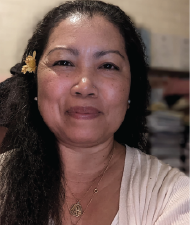Upcoming Webinar
Stories to Tell: The Role of Indigenous Women in Preserving and Data Visualization of Traditional Knowledge in Today's Contemporary Context (SIG-DL and SIG-VIS)
Date/Time: October 6 | 11:00 AM - 12:00 PM EDT
Today, Indigenous women remain at the juncture of two knowledge systems. Hence, Indigenous women's role in preserving and digitalizing traditional knowledge in today's contemporary context outlines self-reliance, ingenuity, creativity and determination. Indigenous women's tenacity cannot be overstated. It is generally argued that information relating to cultural stories and communal practices should be studied within the everyday-life contexts, which provide the scope of the selected literature and aims for a strategic understanding of individual information-seeking and social interaction practices. Perhaps more important is employing the self-determination theory to underpin Indigenous women's motivation and personality as active members in the community and their concerns surrounding digital visualization of traditional knowledge. These issues are rarely discussed at the grassroots level, and the theoretical underpinnings of Indigenous women's voices are not necessarily well understood. The analysis described herein used the person-in-situation approach and practice theory with the underlying assumptions brought into view and analyzed the Storyteller's video recordings in detail in the findings. Practice and person-in-situation theories have guided the Researcher to carve out and visualize the data results in Indigenous ways. Discussing the intellectual and moral copyright of transmitting traditional knowledge and some key theoretical constructs that clarify fundamental premises of documenting Indigenous knowledge. This paper argues that it is possible to understand and illustrate Indigenous women's voices within an integrated theoretical framework that significantly contributes to the information science field.
Presenters
 Dr. Jelina Haines is a Filipino-born Australian with an ancestral link to Indigenous Americas-Mexico. Haines completed her PhD studies in Information Science at the School of UniSA-STEM, University of South Australia. With 20 years of experience working in the Indigenous community. Her research interest lies in interdisciplinary studies related to human information behaviour, ethical information recovery of specific knowledge held by traditional Storytellers, and the social impact of digital technologies in marginalized communities, particularly Indigenous people. Dr. Haines is passionate about the importance of preserving traditional stories and enhancing their value and preservation, assisted by technology for everyday learning practices. An award-winning visual art designer, her collaborative work has been commissioned by major large institutions, including LeHarve Museum, France, the National Gallery of Australia and major museums in South Australia, private companies, and private individuals in 16 countries. Besides, she uses her knowledge as a video ethnographer, Indigenous advocate, and Researcher to promote cultural harmony by working together, regardless of cultural identity, race and tradition. Dr. Haine's doctoral thesis redefined traditional learning by merging art and technology with ethical visualization of living culture, tradition and history, integrating Storytellers' voices, experiences, adaptability, tolerance, and resilience shared in their unique social and cultural contexts. Dr. Jelina Haines is the recipient of the 2022 ASIS&T ProQuest Doctoral Dissertation Award. The importance of the topic to theory development and practical applications in information science; soundness of methodology; organization and clarity of the presentation; and quality of data.
Dr. Jelina Haines is a Filipino-born Australian with an ancestral link to Indigenous Americas-Mexico. Haines completed her PhD studies in Information Science at the School of UniSA-STEM, University of South Australia. With 20 years of experience working in the Indigenous community. Her research interest lies in interdisciplinary studies related to human information behaviour, ethical information recovery of specific knowledge held by traditional Storytellers, and the social impact of digital technologies in marginalized communities, particularly Indigenous people. Dr. Haines is passionate about the importance of preserving traditional stories and enhancing their value and preservation, assisted by technology for everyday learning practices. An award-winning visual art designer, her collaborative work has been commissioned by major large institutions, including LeHarve Museum, France, the National Gallery of Australia and major museums in South Australia, private companies, and private individuals in 16 countries. Besides, she uses her knowledge as a video ethnographer, Indigenous advocate, and Researcher to promote cultural harmony by working together, regardless of cultural identity, race and tradition. Dr. Haine's doctoral thesis redefined traditional learning by merging art and technology with ethical visualization of living culture, tradition and history, integrating Storytellers' voices, experiences, adaptability, tolerance, and resilience shared in their unique social and cultural contexts. Dr. Jelina Haines is the recipient of the 2022 ASIS&T ProQuest Doctoral Dissertation Award. The importance of the topic to theory development and practical applications in information science; soundness of methodology; organization and clarity of the presentation; and quality of data.
